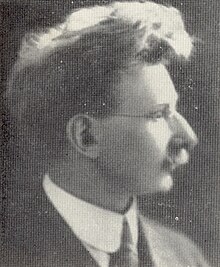Hans Pöögelmann
Hans Pöögelmann (pseudonym Hans Rooskaja ; born December 18 . Jul / the 30th December 1875 greg. In Aidu , Viljandi County ; † 27. January 1938 in Moscow ) was an Estonian poet , translator and politician .
Life
Career
Pöögelmann attended schools in Tuhalaane and Paistu from 1883 to 1885 and was at the Alexander School in Põltsamaa from 1888 to 1892 . One of his teachers here was the poet Jakob Tamm . Subsequently, Pöögelmann was a teacher in the parish of Põltsamaa and post office clerk in Viljandi and briefly in Rostov-on-Don . In 1899 he returned to Jurjew (dt. Dorpat ) and worked at Postimees . In 1901 he went to Samara as a tutor , but was soon back in Tallinn , where he joined the editorial team of the newspaper Teataja ('Anzeiger') founded by Konstantin Päts . At that time Eduard Vilde , Anton Hansen Tammsaare , Otto Münther and Mihkel Martna also worked here .
In 1903 Pöögelmann began studying in Leipzig , where he came into contact with Marxist ideas. In the course of the revolution of 1905 he returned to Estonia and worked again in the editorial office of the Teataja , but soon had to go into hiding. A restless period in exile in Helsinki , London and Paris followed . After returning to Estonia in 1908, he was arrested in 1909 and exiled to Narym in Siberia . From here he was able to flee in 1911 and escape to New York via Tallinn ( Reval ) .
From 1911 to 1917 Pöögelmann published the newspaper Uus Ilm ('New World') in New York . Under his aegis, the newspaper , which was originally oriented towards social democracy, took on a revolutionary-Marxist hue. In 1917 he returned to Estonia to participate in the revolutionary transformation. After the Estonian War of Freedom , he stayed in Soviet Russia and continued to be politically active there. In 1937, however, he fell victim to the Stalin terror and was imprisoned and then executed in Moscow.
Literary work
Pöögelmann wrote, not least under the influence of his teacher Jakob Tamm, already in his school days and oriented himself on contemporary realistic poetry. His first publications took place in Sakala before the turn of the century, and at the beginning of the 20th century his poems appeared in the almanac Kiired ('Rays') by Gustav Suits .
After turning to Marxism, Pöögelmann's poems became more political and the negative attitude towards bourgeois Estonia becomes clear in them. At the same time, they took the form of daily political comments, which is why they have largely been forgotten today. His work as a translator is therefore more durable, considering that he is responsible for the Estonian versions of the Marseillaise and the Internationale .
More important was his work as a translator and author of political writings. Among other things, he published a two-part textbook on economics (1907-1908), a text on the 50th anniversary of the Paris Commune (1922), a history of the class struggle (1929) and a book on Marx and Marxism in Estonia (1933). Pöögelmann has also translated some literary works into Estonian, from English ( Robert Louis Stevenson , Upton Sinclair ) and Russian ( Fjodor Fjodorowitsch Korff ).
bibliography
- Jämedad jooned ('Thick Lines'). Tallinn: Mõte 1910. 32 pp.
- Kewadetuuled ('Spring Winds '). Leningrad: Külvaja 1926. 120 pp.
- Neile, kes "langesid võitluses vendade eest" ('Those who "fell in battle for the brothers"'). Moscow, Leningrad: Külvaja 1936. 43 pp.
Two of his poems are in German in Wilhelm Nerling's anthology.
literature
- Aira Kaal : Hans Pöögelmanni värsse lugedes , in: Looming 5/1958, pp. 776–781.
- Karl Laigna: Hans Pöögelmann - väljapaistev eesti bolševistlik publitsist , in: Looming 8/1958, pp. 1255–1264.
- Endel Priidel: Mälestuskilde Paistust , in: Keel ja Kirjandus 3/1962, pp. 177-182.
- Johannes Feldbach: Mälestuskilde Hans Pöögelmannist , in: Looming 12/1965, pp. 1876–1880.
- Richard Majak: Võitlev rahva poeg. Mälestuskilde kohtumistest Hans Pöögelmanniga , in: Looming 12/1975, pp. 2049-2057.
- Rein Ruutsoo: Kas ka uue uurimisetapi algus? , in: Looming 7/1976, pp. 1224-1226.
- Wladislaw Hedeler , Alexander J. Watlin (ed.): The world party from Moscow. The founding congress of the Communist International in 1919. Protocol and new documents . Akademie Verlag, Berlin 2008, ISBN 3-05-004495-0 , pp. 365 . ( limited preview on Google Book Search )
Web links
Individual evidence
- ↑ On the history and significance of the Alexander School cf. Cornelius Hasselblatt : History of Estonian Literature. From the beginning to the present. Berlin, New York: De Gruyter 2006, pp. 270-271.
- ↑ Karl Laigna: Hans Pöögelmann - väljapaistev eesti bolševistlik publitsist in: Looming 8/1958, p 1255th
- ↑ Eesti kirjanike leksikon. Koostanud Oskar Kruus yes Heino Puhvel. Tallinn: Eesti Raamat 2000, p. 432.
- ↑ Cornelius Hasselblatt: History of Estonian Literature. From the beginning to the present. Berlin, New York: De Gruyter 2006, pp. 403-405.
- ↑ “I push logs” and “Let me”, in: Estonian poems. Translated by W. Nerling. Dorpat : Laakmann 1925, pp. 85-87.
| personal data | |
|---|---|
| SURNAME | Pöögelmann, Hans |
| ALTERNATIVE NAMES | Rooskaja, Hans (pseudonym) |
| BRIEF DESCRIPTION | Estonian poet, translator and politician |
| DATE OF BIRTH | December 30, 1875 |
| PLACE OF BIRTH | Aidu , Viljandi County |
| DATE OF DEATH | January 27, 1938 |
| Place of death | Moscow |
